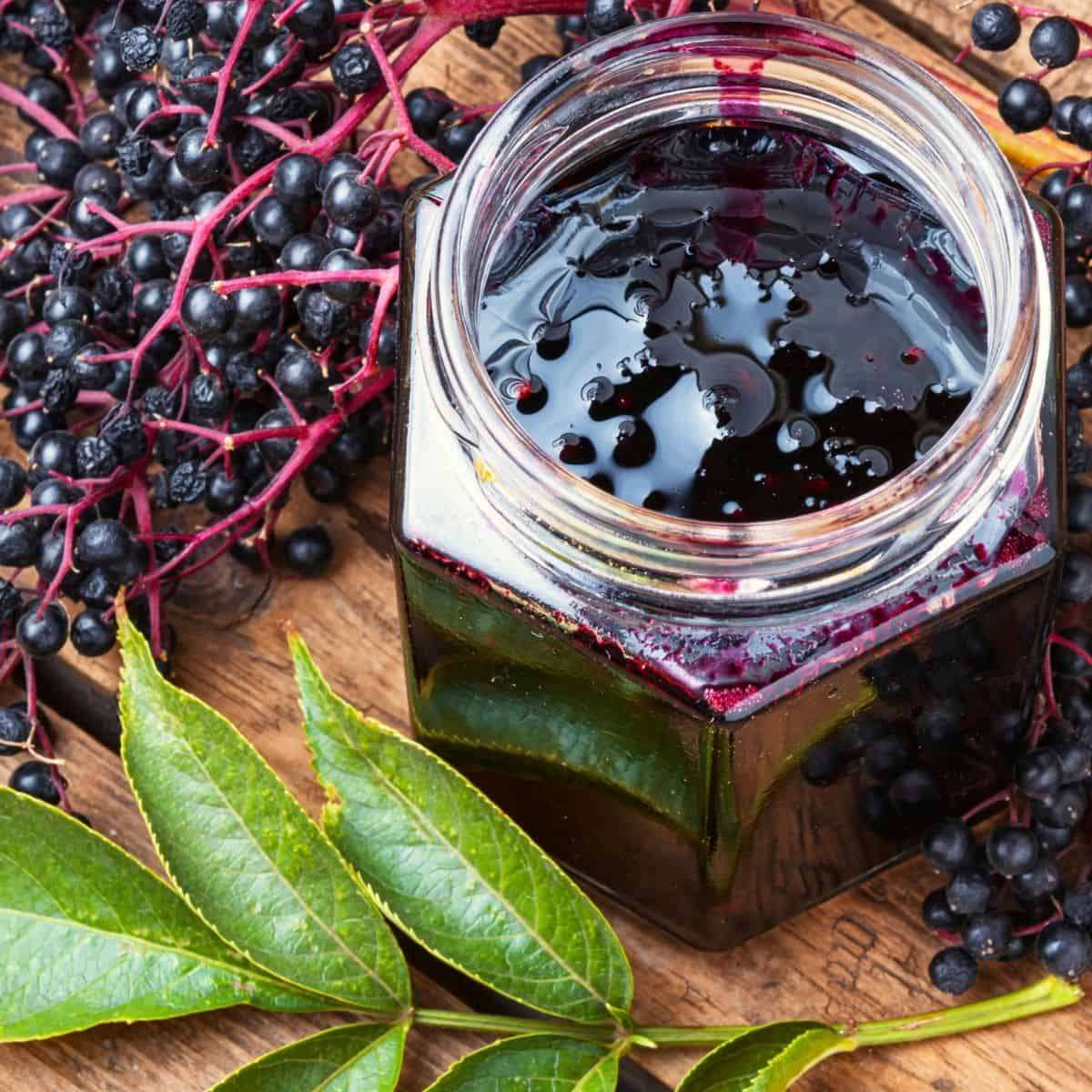
4.5 from 12 votes
Elderberry Jam
This Elderberry Jam Recipe is the perfect way to have the taste and health benefits of elderberries around all year long.
Servings: 16
Calories: 27 kcal
Course:
Condiments , Others
Cuisine:
Vegan
Ingredients
Elderberry Jam
- 1/2 cup dried elderberries (or 1 1/2 cups fresh)
- 3/4 cup filtered water
- 1 1/2 cups apple juice (see recipe notes for alternatives)
- 3 teaspoons sugar-free pectin
- 1/2 cup date paste (see recipe for date paste below or use 1/2 cup low-carb sweetener for lower-carb, or see notes for other alternatives)
Date Paste
- 1 cup dates
- 1 cup water
Instructions
Elderberry Jam
- If using dried elderberries, soak them in enough water to cover overnight.
- Bring berries, water, and juice to a boil.
- Remove one cup of jam mixture from heat, add pectin and date paste or syrup, and blend until smooth.
- Return blended ingredients to pot and bring to a boil once again. Reduce heat slightly and keep stirring for 10 minutes.
- Remove pot from heat and pour jam into canning jars. The sugar-free pectin will harden the jam as it cools.
Cup of Yum
Date Paste
- Soak dates in water overnight.
- Separate the dates from water, and place dates in blender or food processor.
- Blend on medium speed adding date water as necessary to form a thick paste. You shouldn't need more than ½ cup of the date water, and even less for a thicker paste.
- Store in fridge or freezer. Dates can be substituted with other dried fruits, however you may need to boil tougher dried fruits such as apricots and figs for 30 minutes before blending.
Notes
- Originally this post stated that this jam could be canned for up to two years, however, since then, I've learned that elderberries are low in acid and care really needs to be taken when canning them and if you are going to can this jam, then you need to use sugar instead of the date paste.
- Here is how it should be done:
- I have not investigated this topic, and I think that the lemon juice could of course reduce the pH but other things could as well. However, this seems to be crucial information and regardless, the pH needs to be at a safe level (4.6 or lower) for canning.
- You could use acid pH strips or a pH meter to test the pH of your elderberry jam or jelly before canning.
- Typically, a homemade jam that is canned can last up to two years if unopened. Once opened, it should be refrigerated and should last to about 3 months. (source)
- It's possible that the shelf-life when refrigerated could be 6 to 12 months considering that the lid is tightly closed and the jar is undamaged. (source)
- For Jam: the ratio of elderberry pulp to sugar must be no more than: weight of fruit/ weight of sugar = 47/55 = 0.85. For every 16 ounces (1 pound) of fruit pulp you need to use at least 18.9 ounces of sugar.
- For Jam: the ratio of elderberry pulp to sugar must be no more than: weight of fruit/ weight of sugar = 47/55 = 0.85. For every 16 ounces (1 pound) of fruit pulp you need to use at least 18.9 ounces of sugar.
- For Jelly, the ratio of elderberry juice to sugar must be less than or equal to: weight of fruit juice/ weight of sugar = 45/55 = 0.82. For every 16 ounces (1 pound) of fruit juice for Jelly, your recipe must include at least 19.5 ounces, by weight, of sugar. Adding more sugar than that is fine, but less is not.
- For Jelly, the ratio of elderberry juice to sugar must be less than or equal to: weight of fruit juice/ weight of sugar = 45/55 = 0.82. For every 16 ounces (1 pound) of fruit juice for Jelly, your recipe must include at least 19.5 ounces, by weight, of sugar. Adding more sugar than that is fine, but less is not.
- Lemon juice will not reduce the pH sufficiently apparently, but it is good for the end product.
- Lemon juice will not reduce the pH sufficiently apparently, but it is good for the end product.
- Honey cannot be used as the sugar source.
- Honey cannot be used as the sugar source.
- Low-sugar or no-sugar added pectin cannot be used. (source)
- Low-sugar or no-sugar added pectin cannot be used. (source)
Nutrition Information
Serving
2teaspoons
Calories
27kcal
(1%)
Carbohydrates
7g
(2%)
Protein
1g
(2%)
Fat
1g
(2%)
Saturated Fat
1g
(5%)
Sodium
2mg
(0%)
Potassium
66mg
(2%)
Fiber
1g
(4%)
Sugar
5g
(10%)
Vitamin A
28IU
(1%)
Vitamin C
2mg
(2%)
Calcium
6mg
(1%)
Iron
1mg
(6%)
Net Carbohydrates
6g
Nutrition Facts
Serving: 16Serving
Amount Per Serving
Calories 27
% Daily Value*
| Serving | 2teaspoons | |
| Calories | 27kcal | 1% |
| Carbohydrates | 7g | 2% |
| Protein | 1g | 2% |
| Fat | 1g | 2% |
| Saturated Fat | 1g | 5% |
| Sodium | 2mg | 0% |
| Potassium | 66mg | 1% |
| Fiber | 1g | 4% |
| Sugar | 5g | 10% |
| Vitamin A | 28IU | 1% |
| Vitamin C | 2mg | 2% |
| Calcium | 6mg | 1% |
| Iron | 1mg | 6% |
| Net Carbohydrates | 6g |
* Percent Daily Values are based on a 2,000 calorie diet.